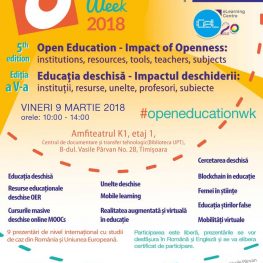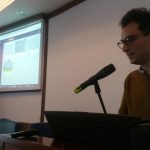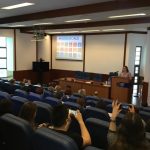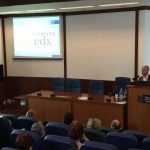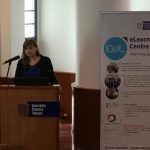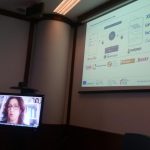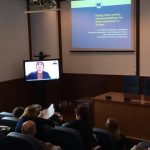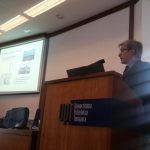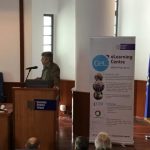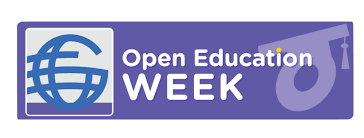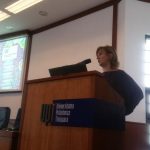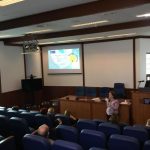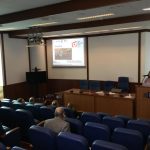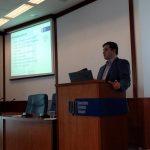Bio speakers
Dr. Andreia Inamorato, European Commission's Joint Research Center (JRC) is Scientific Officer at the European Commission's Joint Research Center (DG JRC). She holds a PhD in Educational Technology from the Open University, UK. Currently, her research focuses on open education strategies, policies, and accreditation of non-formal learning. She is the principal researcher and project manager of the OpenEdu and OpenEdu Policies Projects. The first focused on the 10 dimensions of open education, leading to the OpenEdu framework. The framework is a tool to support openness in higher education institutions and strategic policy design. The latter investigated national policies on open education across the EU and provided policy recommendations, as published in the JRC's report: Going Open: Policy Recommendations on Open Education in Europe. Andreia is also interested in exploring the potential of blockchain for digital accreditation in education, having edited the European Commissioner JRC report ‘Blockchain in Education’. Being Spanish-Brazilian, she has international experience on teaching, open education research and consultancy. Before joining the JRC, she was a lecturer and consultant at HE in Brazil (DigiLearn, 2011-2013). Prior to that, she had a research fellow post on OER (open educational resources) at the Open University UK (2006-2011). In this presentation Andreia will focus on the recent publication 'Going Open: Policy Recommendations on Open Education in Europe'. This report brings policy recommendations on open education at regional, national and EU levels. She will also introduce the case study on open education from Romania, as featured in the accompanying report 'Policy Approaches to open education: Case Studies from 28 EU Member States'. The latter report presents case studies about how each country approaches open education policies. Both reports are part of the JRC's OpenEdu Policies project. These reports are the final outcome of one and a half years of intensive research into open education policies involving many stakeholders, particularly ministries of education, research and science across Europe.
Prof. Ilona Buchem is a Professor for Media and Communication at Beuth University of Applied Sciences Berlin, Faculty I Economics and Social Sciences. She holds a PhD degree in Business Education from Humboldt University Berlin, Certificate in Business Administration from St. Gallen University, Switzerland and Master degree in Applied Linguistics and Communication from Warsaw University (Poland). Ilona Buchem has led a number of research and development projects including the recent project Open Virtual Mobility (Erasmus +, Strategic Partnership, 2017 - 2020), Open Badge Network (Erasmus +, Strategic Partnership, 2014 - 2017), BeuthBonus and CreditPoints (Qualification Programs for Migrant Academics as part of the German Federal Program “IQ - Integration through Qualification”, 2013 - 2020), Digital Future (Digital Strategies for Higher Education, Stifterverband - German Association of Foundations for Science, 2015 - 2017), Wikipedia-Diversity - a research project in cooperation with Wikimedia Germany promoting gender mainstreaming in the German Wikipedia. Open Badges are digital credentials based on an open standard which allows various types of skills, competencies and achievements to be recognized and shared across the web. Schools, universities, employers and informal learning providers globally are using Open Badges to capture lifelong learning which may be unrecognized by traditional forms of credentialing. This talk will introduce Open Badges as an open, digital infrastructure and an ecosystem of open digital credentials for the digital age.
Sandra Kučina Softić is Assistant Director for Education and User Support at the University of Zagreb University Computer Center (SRCE) and EDEN vice-president for Open Professional Collaboration. She is also the Head of the E-learning Center at SRCE and the Head of the Office for E-learning at the University of Zagreb. Her work is focused on monitoring and fostering the e-learning implementation in higher education institutions in Croatia and providing support and advice to institutions, teachers and students in implementation of new technologies in learning and teaching process. In 2016 she was appointed Croatian representative in ET2020 Working group on Digital Skills and Technologies. Her field of interest is strategic decision making related to the implementation of e-learning, open and distance education. She has been involved in a number of projects (national and international) related to these fields and she also actively presents at international conferences. One of the priorities to advance the movement of open education is communities and networking. The importance of sharing information, exchanging experiences and best practices, building new knowledge and communities of practices is of great value. The European Distance learning Network EDEN in international organization which within its mission supports and foster openness in education and science but in society as well. Some of the initiatives and activities EDEN takes in this field will be presented. Another initiative which is going at this moment is Erasmus + project ReOPEN (Recognition of Open and Valid Learning) which is dealing with issue of recognition and validation of non-formal open education. What has been done in this project so far and how its results can contribute to the society will be presented in this webinar.
Prof. Radu Vasiu he is a professor at the Faculty of Electronics and Telecommunications of the Politehnica University of Timișoara. His recent research focuses on e-learning, multimedia, web technologies, open data and smart cities. He is the president of the Senate of the Polytechnic University of Timișoara and the Director of the Multimedia Research Center. He has published 12 books and presented over 100 papers at various international conferences. He has participated in 28 international research and cooperation projects and is part of 7 international professional associations.
Dr. Diana Andone is the director of the ID / IFR and e-learning Center within the Polytechnic University of Timișoara, responsible for the planning and implementation of distance education and head of works in the field of multimedia and interactive web technologies. For the last 20 years she has taught at various European universities, been involved in over 30 European-funded projects and published extensively internationally. He is currently a member of the executive committee of the European Distance and e-Learning Network (EDEN), president of multiple international conferences, member of the Timișoara European Capital of Culture 2021 task force and active supporter of local start-up movements. He currently runs UniCampus.ro - the first Romanian MOOCs platform and actively promotes open educational resources.
Carmen Holotescu he is a professor at the Faculty of Engineering of the “Ioan Slavici” University of Timișoara, with a doctorate on new technologies and open education. He has participated in many European projects and has rich experience in designing and implementing learning and collaboration platforms based on open pedagogies. He has written over 100 articles and books related to eLearning / Blended Learning, Social Media, Open Educational Resources (OER), Massive Open Online Courses (MOOCs), mentioned in over 1000 citations. He is a certified online instructor at the University of Maryland University College, USA, facilitating online courses at this university for 12 years. It will present blockchain technology and how to build a global, secure and transparent educational network.
Gabriela GROSSECK is an associate professor in the Department of Psychology at the West University of Timisoara, Romania. With a rich experience in the use of ICT in education (teaching, learning and research) she is especially concerned with the training of students and teachers, both in face-to-face and online environments. For over a decade he has been the editor-in-chief of the Romanian Journal of Social Informatics. Author of numerous articles in the field of e-learning, he has a sustained presence as a speaker at various international events, organizer of workshops or member of various editorial committees (magazines and / or conferences). His research interests cover the main aspects of open education (OERs / OEPs and MOOCs), Web 2.0 tools and social media applications in higher education and, more recently, the area of "digital literacy". The phenomenon of false news is not new. Fake news is a concept that has become a challenge not only for online content providers but especially for the educational environment. In Romania, so far there are no studies on the effect of false news in education. Therefore, UVT has announced its intention since 2016 to address this issue, proposing several approaches. What is false news, how do we recognize it, but especially how do we fight it - is the subject of this presentation.
Radu Ticiu, Promoting entrepreneurship in Timisoara and leading Startup Hub, Seedcamp mentor, TiMoDev founder, CoderDojo champion & promoter.
Virgil Rotaru is a project manager and researcher at the Victor Babes University of Medicine and Pharmacy in Timisoara. His speech will be a presentation of the complicated quad-propeller engine and the power of the "open engine", which requires the use of seat belts, such as those for Lockheed F-35.
Prof. Dr. Eng. Muguras Daniel Mocofan received his PhD in Electronic Engineering and Telecommunications from the Politechnica University of Timisoara, Romania in 2003.
His research interests are in the field of multimedia databases, image processing, dynamic textures, smart cities, mobile applications, e-learning, multimedia and web technologies.
Șl. Dr. Eng. Silviu Vert works in the Communications Department of the Polytechnic University of Timisoara. In 2015, he completed his doctoral studies with the theme of exploring open data in augmented reality applications. He is also a developer for the e-Learning platform of UPT - Virtual Campus. Silviu is actively involved in advocacy activities in "open government" at local and national level. In his presentation we will explore virtual reality techniques and applications used in open education, with visible results in the interest and creativity of students.
Dr. Vlad Mihăescu has a PhD in educational and technological models MOOCs and has 9 years of experience as a trainer in areas such as multimedia technologies, social media, e-tourism, e-learning, usability, programming, soft skills and leadership. Author of over 20 scientific papers and book chapters published at international conferences and magazines, Vlad has entrepreneurial experience in ITC, event organization and tourism. He is currently the executive director of Nanotech, a consulting and training company, an associate professor at UPT but also a member of the CeL team. Vlad is the only licensed facilitator in Central and Eastern Europe for Robin Sharma's Lead Without a Title course. It will present the impact of various web tools in master laboratories within UPT.
Camelia Ciuclea - PhD student at the Polytechnic University of Timisoara, at the Faculty of Management in Production and Transport and Academic and Administrative Manager at the ID / IFR and e-Learning Center. She is involved in organizing and carrying out the activities initiated by the e_Learning Center (national and international conferences, workshops, project meetings, student competitions, training programs, etc.) managing (as a collaborative effort, together with the entire CeL team) good development of distance learning in UPT).
